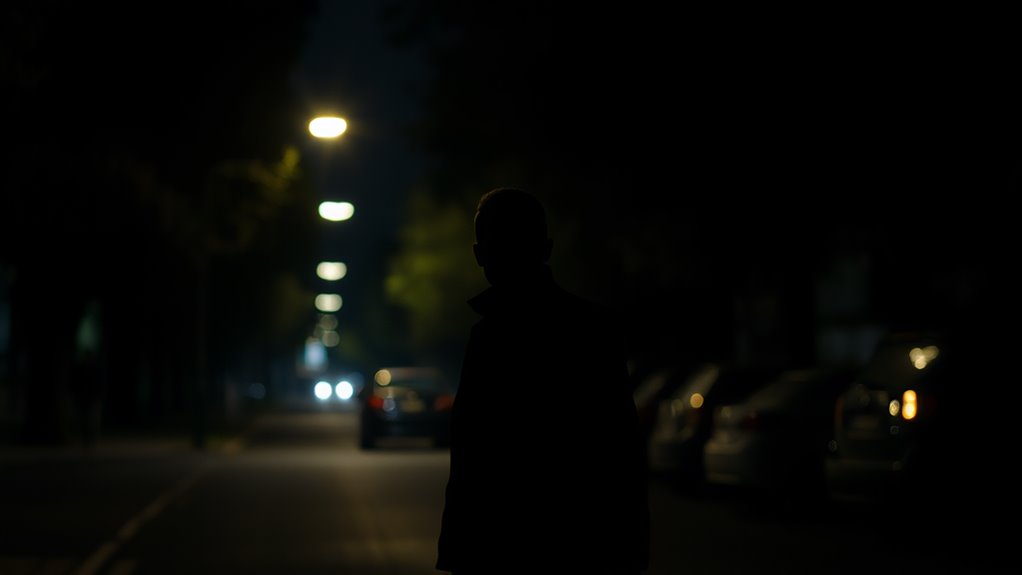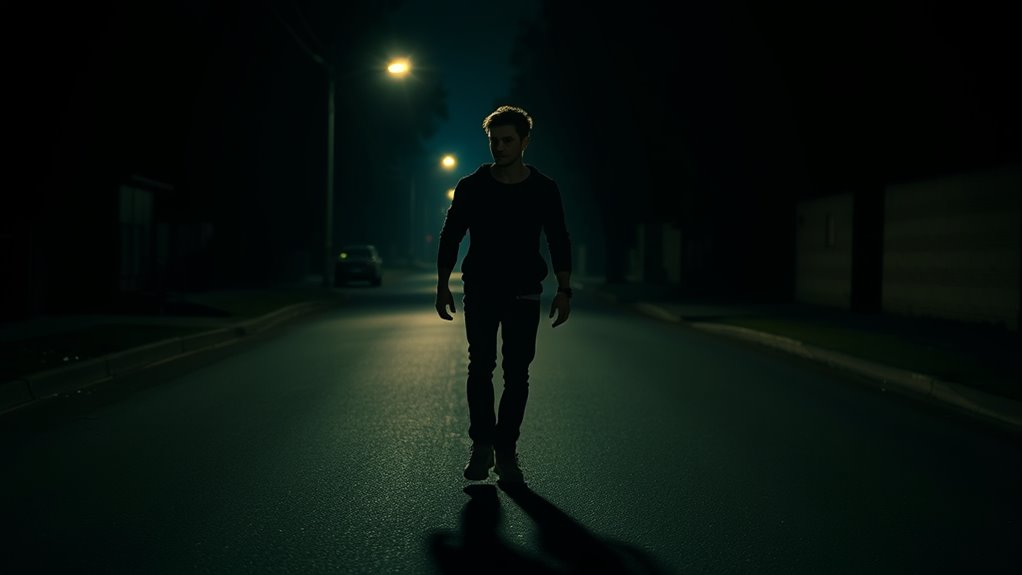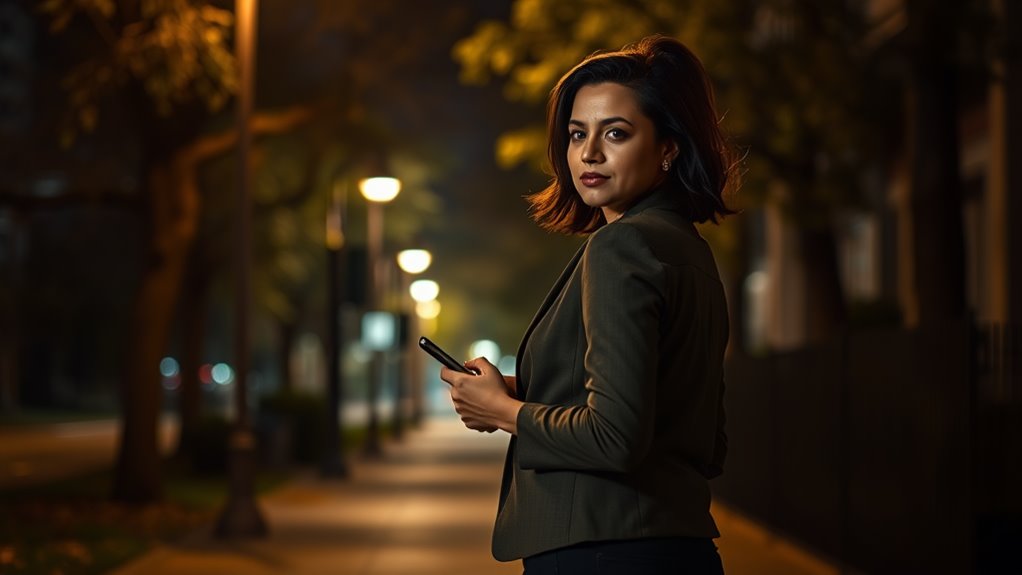Walking alone at night can feel risky, but you can take steps to protect yourself. First, stay aware of your surroundings; trust your instincts when something feels off. Choose well-lit routes and stick to main streets to avoid isolated areas. Carry personal safety devices like pepper spray or a personal alarm for quick access if needed. Maintain a confident posture and walk with purpose to deter potential threats. Avoid distractions like your phone or headphones to stay alert. With these strategies in mind, you'll feel safer and more empowered in your nighttime strolls. There's more to explore on the topic.
Stay Aware of Your Surroundings

When you're walking alone at night, staying aware of your surroundings is essential for your safety. By practicing situational awareness, you can better assess potential threats and make informed decisions.
Start by engaging in environmental scanning; this means observing your environment for anything unusual or out of place. Keep an eye on nearby pedestrians, vehicles, and any potential hiding spots. Listen for sounds that might indicate danger, like sudden footsteps or raised voices. It's also beneficial to carry a Pepper Spray For Cars with a visor clip for quick access in case of an emergency.
Trust your instincts—if something feels off, it probably is. Stay focused on your path, avoiding distractions like your phone. By actively scanning your environment and maintaining awareness, you enhance your ability to react quickly if you encounter a situation that requires a defensive response. Consider carrying a defense spray as an additional measure to protect yourself, especially in scenarios with multiple assailants.
Choose Well-Lit Routes
Choosing well-lit routes is essential for your safety while walking alone at night. To enhance your security, engage in strategic planning before you head out. Familiarize yourself with the area and identify paths that are well-lit and populated.
Stick to main streets and avoid dark alleys or isolated shortcuts, as these can increase your vulnerability. The more you know your route, the better prepared you'll be to navigate safely. Carrying a compact Triad 27,000,000 Volts Stun Gun with its powerful stun capability and built-in safety features can offer additional protection and peace of mind.
If you're unsure about a path, consider using an app that highlights safe walking routes. Your safety is paramount, so prioritize visibility and stay alert. Additionally, carrying a reliable tool like the Bouncer stun gun flashlight with its 280 Lumen flashlight can provide both illumination and protection during your night walks.
Trust Your Instincts

Trust your instincts; they're often your first line of defense.
When you're walking alone at night, pay attention to your gut feelings. If something doesn't feel right, don't hesitate to change your route or seek help. Your intuition is a powerful tool, honed through experiences and intuition training, that can alert you to potential dangers before they escalate.
Sometimes, your subconscious picks up on cues that your conscious mind might overlook. Trusting these feelings can mean the difference between safety and vulnerability.
Practice tuning into your instincts regularly—this not only sharpens your awareness but also reinforces your confidence. Remember, it's better to be cautious than to ignore a nagging sense that something's off.
Stay alert and trust yourself.
Use Personal Safety Devices
Having a keen sense of your surroundings is important, but equipping yourself with personal safety devices can greatly enhance your security while walking alone at night.
Consider carrying pepper spray; it's a reliable option for deterring potential threats. Personal alarms and emergency whistles can alert others if you're in danger, while safety apps can help you share your location with trusted contacts.
Self-defense keychains offer an easy-to-carry option that doubles as a practical tool. Tactical flashlights not only illuminate dark areas but can also temporarily blind an attacker.
For added security, personal tasers provide a more assertive defense mechanism. By integrating these devices into your routine, you can walk with greater confidence and peace of mind.
Walk With Confidence

Walking with confidence can greatly deter potential threats and make you appear less vulnerable. Your body language speaks volumes, so stand tall and maintain an assertive posture.
Keep your shoulders back and your head up, scanning your surroundings without appearing anxious or distracted. This not only shows you're aware but also makes you less of a target.
When you walk with purpose, you send a clear message that you're in control. Avoid shuffling or looking down at your phone, as these habits can signal uncertainty.
Instead, take deliberate steps and project a sense of self-assurance. Remember, a confident demeanor can be your best defense when maneuvering the streets alone at night.
Avoid Distractions
Distractions can be your worst enemy when walking alone at night. Keeping your focus sharp is vital for your safety. Avoid using your phone excessively; it's important to practice good phone etiquette.
If you must answer a call or send a message, find a well-lit area to stop. This way, you can stay aware of your surroundings.
Stay mindful of auditory awareness, too. Don't drown out sounds with headphones or loud music. You want to hear footsteps, voices, or any unusual noises that might indicate danger.
Practice Self-Defense Techniques

Staying alert and aware of your surroundings is just the first step in ensuring your safety at night.
To further enhance your self-defense skills, practice techniques like shadow boxing. This exercise helps you improve your movements, build confidence, and visualize potential threats.
Incorporate situational drills to simulate real-life scenarios. For example, practice responding to an attacker approaching from behind or in a confined space. These drills sharpen your reflexes and prepare you for unexpected situations.
Regularly rehearsing these techniques not only boosts your physical capabilities but also strengthens your mental resilience.
Know Emergency Contacts
Your safety plan should always include knowing your emergency contacts. Make certain you have a reliable contact list that includes friends, family, or neighbors who can help you in a crisis.
Share your plans with them, so they know when to expect you and can check in if you're late.
Consider downloading emergency apps that allow you to quickly notify your contacts if you feel unsafe. These apps often have features like location sharing and panic buttons, making it easier to get help when you need it most.
Regularly update your contact list and confirm your chosen contacts are aware they might receive emergency alerts. Staying connected can greatly enhance your safety while walking alone at night.
Frequently Asked Questions
What Should I Do if I Feel Unsafe Approaching My Home?
If you feel unsafe approaching your home, trust your instincts. Use safety apps to share your location and alert emergency contacts. Stay aware of your surroundings and consider calling someone to keep you company.
How Can I Identify Potential Threats in My Environment?
To identify potential threats, enhance your situational awareness. Notice unusual behavior, stay alert to your surroundings, and trust your instincts. Practicing threat recognition helps you spot dangers before they escalate, keeping you safer.
Are There Specific Self-Defense Moves Everyone Should Learn?
Yes, you should learn basic self-defense moves. Effective techniques like palm strikes, knee strikes, and escape maneuvers can empower you in threatening situations. Practicing these skills boosts your confidence and prepares you for unexpected encounters.
What Should I Carry in My Bag for Self-Defense?
For self-defense, you should carry pepper spray, a personal alarm, and a self-defense keychain. Consider flashlight options for visibility, a tactical pen for protection, and a safety whistle to alert others if needed.
How Can I Build Confidence When Walking Alone?
To build confidence, practice assertive body language by standing tall and making eye contact. Enhance your situational awareness by staying alert and observing your surroundings. You'll feel more empowered and assured in any environment.
So Here Is What We Learned
By staying aware of your surroundings and trusting your instincts, you can greatly enhance your safety while walking alone at night. Choose well-lit routes, avoid distractions, and walk with confidence to deter potential threats. Don't forget to use personal safety devices and practice self-defense techniques for added security. Finally, always know your emergency contacts. With these strategies in mind, you can feel more empowered and ready to navigate the night safely. Stay vigilant and take care!




